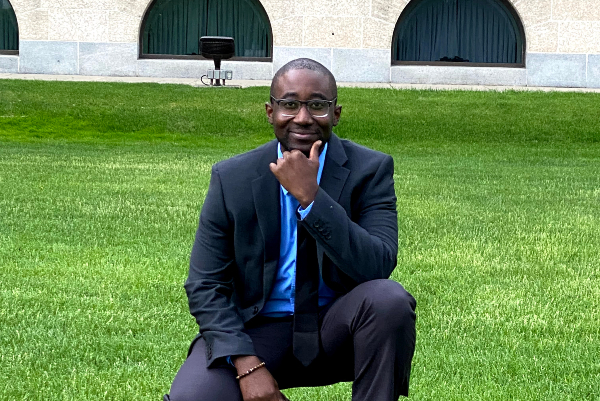
Learning on the front lines of social services
Kwaku Ayisi saw the holes in Saskatchewan’s social service systems, and wanted to fix them.
By Matt Olson for JSGSKwaku Ayisi had an idea of what his thesis project would be at the Johnson Shoyama Graduate School of Public Policy (JSGS) well before he started.
Ayisi was originally interested in the Master of Public Policy (MPP) program at JSGS because he eventually wanted to get into teaching. But it was his work experience that pointed him in the direction of what would be an award-winning thesis.
“My first thesis choice was Indigenous people’s policy,” he said. “I had spent a long time in child welfare as a frontline youth care worker, and most of the kids that are put into care are of Indigenous ancestry.”
Ayisi earned his undergraduate degree in economics at the University of Saskatchewan, after transferring from St. Francis Xavier University in Nova Scotia. Soon after that he pursued an MBA at the University of Regina, and began working at a non-profit group home while studying for that second degree.
When he started at the home, Ayisi said he didn’t know much about the history of residential schools, or the generational trauma that still affects many Indigenous Canadians.
But his experiences in the workplace led him to some important observations of the flaws in the system — especially how Indigenous children moved through foster care.
“It seemed that it was a cycle,” he said. “What the organization I worked for claimed to offer wasn’t what I was seeing. The focus on what the programs were did nothing to help the children overall, and I noticed I wasn’t hearing success stories.”
As Ayisi put it, he quickly realized the best way to make a difference would be by doing so on the public policy level. So although he initially considered the MPP program out of a desire to teach, he could see the holes in the system he wanted to help fill.
“What better way to make a difference than to influence public policy in some way, shape, or form?” he said.
Ayisi’s thesis focused on the idea of “decolonizing” child welfare and well-being through the study of the Cowessess First Nation Miyo Pimatisowin Act.
The Act, one of the first of its kind in Canada, transfers the rights and responsibilities for children from Cowessess First Nation back to the First Nation from the provincial government.
The goal of the act is to change the way child welfare is approached, and to allow the First Nation to be involved in that process for every child from Cowessess.
“The Miyo Pimatisowin Act was the first one that was ratified,” Ayisi said. “My study was to look into how they developed it, but for the largest part how they are implementing it, and specifically how they are doing it in a decolonized way.”
As part of his research, Ayisi had the opportunity to speak and work with representatives from Cowessess First Nation, including then-Chief Cadmus Delorme.
Ayisi called it a “humbling” experience to engage with Chief Delorme and a First Nation that had succeeded — through the implementation of policy — to address some of the issues Ayisi had seen as a frontline worker.
“The main purpose of the research, if it’s not going to be in any way beneficial to the community, it’s pointless,” he said. “My goal was to be able to amplify a lot of what they are doing, which would reflect self-governance, which would reflect actually handling the issue of over-representation of Indigenous children in care.
“One of my most important findings was that, since the implementation of the Cowessess act, not a single Cowessess kid had been apprehended. At the time, it was very obvious that this is what needs to be done, not just by Cowessess but all other First Nations and Indigenous groups, to take control of their own children.”
Ayisi’s passion for his thesis project helped win him a number of scholarships, including one of the City of Regina’s Henry Baker Scholarships awarded to students making a difference in their community.
He also participated in the U of R’s Three-Minute Thesis (3MT) competition, wherein students are required to present their thesis and its potential impact and implications in three minutes or less. Ayisi won first place at the Regina competition, placed second in the Western Regional competition, and was able to place in the top three at the national level.
Ayisi said he was “very blessed” to receive so much attention and support for his thesis work, crediting the people at JSGS for the support they’ve given.
“I cannot overstate what an incredible supervisor I have, Dr. Cheryl Camillo (PhD). When I switched my thesis, she didn’t have to accept me. She wasn’t obliged to, but she did,” Ayisi said. “She saw something in me, and I would not be where I am without her.”
He’s even taken his first steps into teaching, currently working as a sessional lecturer with First Nations University.
So while the path has been a winding one, Ayisi wouldn’t have wanted to take a different one.
“I couldn’t have asked for more,” he said. “If you’re looking at public policy, it’s one of the best schools — if not the best school — in Canada.”

